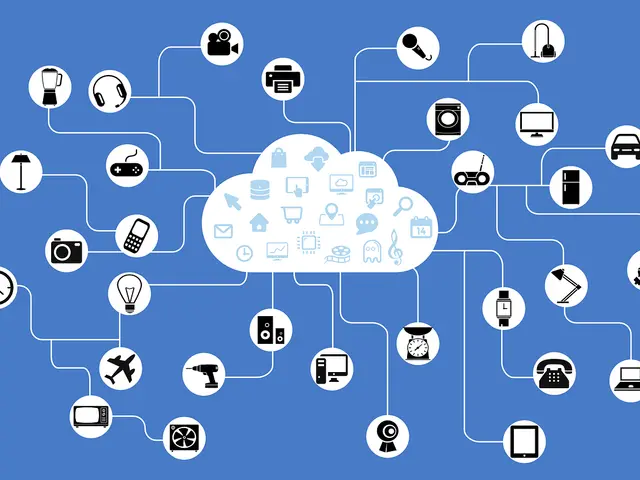The Distinction Between Solitude and Feeling Isolated
In today's fast-paced world, the importance of social connections cannot be overstated. However, it's crucial to distinguish between being alone and experiencing chronic loneliness, as the latter poses significant health risks.
Chronic loneliness, characterized by the subjective feeling of social disconnection, is more than just a state of being alone. It triggers chronic stress responses, leading to a myriad of health issues. Unlike being physically alone, loneliness is harmful to both mental and physical health.
Research reveals that chronic loneliness is strongly associated with mental health issues such as depression and anxiety. In fact, over 50% of chronically lonely individuals screen positive for depression, and the risk of clinical depression is up to five times higher compared to those not feeling lonely [3][1].
Moreover, loneliness increases the risk of cardiovascular disease, comparable in harm to smoking 15 cigarettes per day for older adults [1][2]. It's also linked to poorer cognitive function and higher risks of dementia, including Alzheimer’s disease [2][4].
Chronic loneliness activates sustained stress responses, leading to hormonal imbalances, immune dysfunction, chronic inflammation, and physical decline [2][4][5]. Consequently, it raises the risk of premature death from cardiovascular and depression-related causes [1][2].
Being alone, on the other hand, does not inherently cause these health problems unless accompanied by feelings of loneliness or social isolation. Some people can be alone yet socially connected and mentally healthy. However, physical isolation can contribute to poor behaviors such as inactivity, poor diet, substance use, and medication non-adherence, which worsen health outcomes especially in older adults [4][5].
To summarize the distinction:
| Aspect | Chronic Loneliness | Being Alone (Physical Isolation) | |-----------------------|-------------------------------------------------------------|----------------------------------------------------------| | Definition | Subjective feeling of social disconnection | Presence of solitude without necessarily feeling lonely | | Mental health risk | High risk of depression, anxiety | Risk depends on subjective feeling of loneliness | | Physical health risk | Increased risk of heart disease, stroke, cognitive decline | Risk arises mainly from secondary effects (inactivity, poor care) | | Stress/inflammation | Chronic activation leading to systemic health issues | Less direct unless loneliness is also experienced | | Mortality risk | Increased premature death rates | Variable, influenced by loneliness and health behaviors |
Chronic loneliness is a serious health hazard affecting millions worldwide, particularly older adults. It requires clinical attention and interventions such as social connectivity programs, community engagement, and mental health screening [3][4][5]. Being alone is not necessarily harmful but can become so if accompanied by loneliness or insufficient social support.
Valuing both independence and companionship creates a fulfilling and sustainable lifestyle. Fostering strong relationships ensures support during challenging moments and enhances overall wellbeing. Loneliness describes feeling unhappy due to a lack of meaningful social connections, while being alone refers to the state of having no other person physically present.
Fostering authentic connections plays a vital role in preserving mental health across various stages of life. Creating and maintaining relationships actively strengthens emotional stability. Introverts often prefer spending time alone to avoid emotional drain from prolonged social interaction. Taking intentional breaks from a busy lifestyle helps maintain balance and protect mental health.
Embracing alone time can nurture self-awareness and promote emotional resilience. Appreciating one's own company is considered a healthy personal trait by many experts. Participating in regular community or social activities nurtures belonging and supports mental wellness. A healthy balance between solitude and social connection is essential for emotional resilience.
In conclusion, chronic loneliness, beyond simple solitude or isolation, is now recognized as a critical public health concern [1][2]. Emphasizing the importance of social connections and mental health, it's crucial to foster authentic relationships, appreciate our own company, and seek help when feeling chronically lonely.
Mental health is significantly affected by chronic loneliness, with over 50% of chronically lonely individuals screening positive for depression. This feeling of social disconnection also increases the risk of cardiovascular disease and dementia, including Alzheimer’s disease.
On the other hand, being physically alone does not necessarily lead to these health issues unless accompanied by feelings of loneliness or social isolation. Nevertheless, physical isolation can contribute to poor health outcomes due to secondary effects like inactivity and poor care.
To prevent the negative effects of chronic loneliness and foster well-being, focusing on personal growth and education-and-self-development is essential. This includes fostering strong relationships for emotional support, engaging in health-and-wellness activities, and cultivating self-awareness through solitude.






